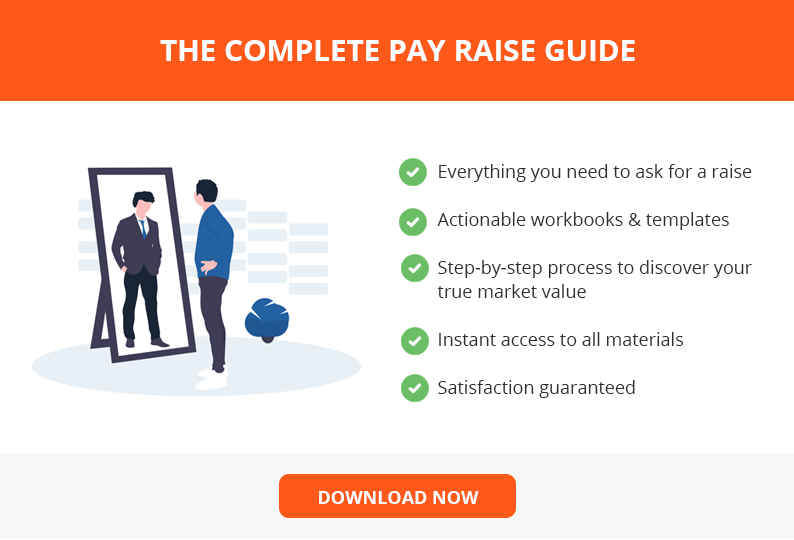Getting over the hurdle of asking for a raise in the first place is a significant accomplishment. But asking for a raise is only the beginning of the process. Only 70% of people who ask for a raise end up getting one according to a 2018 Payscale.com report. And 31% of the people who receive a raise don’t get as much as they asked for. Raise Guide takes readers through how to best ask, and we’ll show you how to ask for a bigger raise than offered.
While many Americans are trained by our consumer culture to be grateful for whatever their employers offer, there are circumstances when it’s appropriate to challenge decisions about your pay. Knowing how to ask for a bigger raise than offered will help you feel confident in any salary negotiation, whether it’s the initial ask or a request to increase the amount of a raise.
Knowing how to ask for a raise is just as important as knowing how much to ask for.
If you’re one of the 31% of Americans who were expecting more from their raise, this guide provides some essential things to think about before you start the conversation.
How to Ask for a Bigger Raise than Offered
- Know your value and what you’re worth to an organization
- Think like a boss, and approach the situation like your manager would need to follow
- Avoid mentioning personal reasons
- Don’t compare yourself to your coworkers, but do compare yourself to industry standards
We’ll go through each of the topics and plenty more in detail below.
Know your value
No matter how much you’re currently paid, it’s human nature to feel like that amount isn’t enough. Feeling underpaid is a natural feature of being an employee. Especially when the job market is strong, and there are plenty of options available for skilled workers.
If you don’t feel like you’re paid enough for the work you perform, you aren’t alone. According to 2019 Gallup poll data, only 37% of Americans feel completely satisfied with their current salary. Even though most Americans polled said they’re happy with their job overall, and they feel confident about their job security, most people still don’t feel like they’re paid enough.
The question to ask yourself is not whether you’re paid enough, but whether the work you’re doing is more valuable to the company than your current salary reflects. Re-framing the question in terms of your value to the company takes away the innate tendency to overvalue your contribution.
Think Like a Boss
When you ask for a raise, what you’re saying to your boss is, “I think I’m more valuable than you realize.” So, essentially, you’re telling your boss (who was likely involved in hiring you) that their assessment of your value to the company is incorrect.
Disruption can be a risky business, especially when your livelihood is on the line like it is in salary negotiations. When you ask your boss to take another look at your value, there’s no guarantee that they’ll see things the way you do. They may realize they’ve overestimated what they should pay you.
Take control of the conversation by touching on key points of interest that will emphasize your value to the company. You’ll also want to avoid some common pitfalls like talking about your personal story. The goal in a salary negotiation is to present a solid case for the value you offer to the company, not to come across as if you’re begging for a handout.
How to talk about your value
The reasons you give for requesting a raise are crucial to your chances of receiving one.
While it might be tempting to explain all the reasons that you need the money, talking about your back-story is not appropriate in a salary negotiation.
The best approach to discussing a new raise with your boss is to present evidence of your value to the company. Talk about what you have to offer more than you talk about what you need.
If the question is how to ask for a bigger raise than offered, you need to approach the situation with even more tact.
Here are some important things to consider when putting together your argument.
Show it, don’t tell it
You might be the best salesperson in the world, but you won’t get anywhere by telling your boss about it. To prove your worth as an employee, you need to show tangible results from your work.
Creating a presentation that includes case studies and analysis of successful projects that you were part of will help to support your argument when you ask for a raise.
Treat your salary negotiation the same you would treat a sales presentation to a big client. Show your boss why they should value you rather than telling them they need to.

Be bigger than your job
When you’re an entry-level employee, upper management probably won’t think much about what you do in your spare time. As you rise through the ranks, though, your bosses want to see that you’re a well-rounded individual. One who isn’t going to burn out or get bored.
When you ask for a raise, you’re asking for the company to increase its investment in you as a long-term employee.
To show that you’re passionate about more than your paycheck, add some mentions of personal projects you’ve taken on that relate to your position.
You might start a blog relating to your experience in the industry; or write an article for a magazine or online publication. Even attending a conference on your own time can show that you’re more than just a worker drone and that you deserve to be valued higher by your company.
Avoid offering back-story
It’s a harsh reality to accept, but your boss doesn’t care how much you need the raise. Your experience and ability are what’s valuable to your company, not any personal hardship or exceptional circumstance.
Make your case from a positive and confident standpoint. Focus on why you’re more valuable to the company, not on how you need more from it.
Be proud of your credentials
Mention any professional certifications or continuing education you’ve completed. Even though your HR file may reflect your current credentials, it can’t hurt to point out any new accomplishments. They may make you more qualified for a more significant role (and a better paycheck) in the company.
Don’t be overconfident
Asking for more than you are worth can cause serious problems. At the very least, it’ll make things awkward between you and your boss. In the worst cases, overstating your importance to the company can even threaten your job security.
If you aren't sure you're worth a bigger raise than offered, consider leaving well enough alone and don't ask for it. Share on XPro-tip: If you aren’t sure you’re worth a bigger raise than offered, consider leaving well enough alone and don’t ask for it.
Don’t Compare Yourself to Your Co-Workers
Unless you’re working in a government agency or a highly-structured environment, decisions about individual pay-rates are made by management. Often on a case-by-case basis.
Don’t approach your request for a raise by pointing out what your co-workers make. Even if you know you make less than people in the company who are doing the same or similar work, pointing that fact out to your boss can work against you.
Pointing out to your boss that you make less than your co-workers can have the opposite of the desired effect. This places a sub-conscious suggestion that you are less valuable than the others in the office. After all, if you were a good employee, why would you be making less money than everyone else?
This phenomenon is an example of confirmation bias. It may be completely irrational, but psychology is powerful stuff.
Even if your boss doesn’t succumb to this weird, suggestive power of confirmation bias, there are some hazards in comparing yourself to your co-workers:
- It makes you look petty and competitive.
- This approach calls into question how you got information on your co-workers’ salary.
- Asking may draw attention to your deficiencies as compared to others in the office.
- Your co-workers’ salaries are none of your business.
Do Compare Yourself to Industry Standards
Comparing yourself to others in your company is a no-no. But pointing out industry standards and trends can be helpful. It’s a way to show how your salary doesn’t measure up to your value.
Avoid these complications in comparison. Expand the comparison to the entire industry. The results of your salary research might even be valuable to your company. And for more significant reasons than determining your salary raise.
How to conduct salary research
The first thing to figure out how to ask for a bigger raise than offered is to figure out what other people in your job role get.
You can start by looking at your co-workers. Make sure first that your company doesn’t have a policy against discussing salary. Your company likely won’t prohibit discussing salaries. In many countries, these bans are illegal. But discussing salary with others in your company might lead to awkwardness, competition, and other complications.
The best place to look for data on appropriate compensation is on the internet. Researching industry trends in salary and benefits for your job type will provide you with useful tools for negotiating your raise.
There are lots of online tools you can use to do salary research. The most obvious way is to do a job search on Indeed, Glassdoor, or other job posting sites and see what other companies are offering.
Resources for checking salary comparisons
If you want to get a bit more sophisticated, check out the following resources for researching salaries in your industry:
- Payscale – An extensive database of wages, education, job requirements, and other statistics that you can use for detailed research on a broad range of topics related to career advancement and job searches.
- U.S. Bureau of Labor Statistics – This federal agency provides all kinds of data on pay rates, job descriptions, and whatever else you might want to know about labor and employment in the United States.
- U.S. EEOC – If you suspect that you’re not being paid fairly, the Equal Employment Opportunities Commission can provide all kinds of support to help you figure out what to do. They also offer a ton of useful data. This includes salaries, benefits, paid leave, and other employment data that can be useful in your research.
- Idealist – Another salary and hiring information database, Idealist focuses on nonprofit organizations and the specific issues associated with this sector.

How your salary research can help your company
When you conduct detailed salary research, you might even find that it provides valuable information beyond supporting your request for a raise.
Researching the salaries and role descriptions posted by other companies can provide useful data about trends in your industry. Especially in cutting-edge technology, the trends that are emerging in the sector might first appear in hiring patterns.
If you want to put your inner business analyst to work while you conduct your salary research, you might unlock potential new areas of business for your company to explore.
Companies put a lot of time and money into staying current with industry trends. If you make the results of your detailed research available to your managers, they might find it useful in big-picture planning.
This kind of research is especially valuable in small companies and startups that don’t have their own research department. It goes beyond your task of how to ask for a bigger raise than offered.
Other benefits of researching salary data
Salary research can also help you bring your skills into focus. You may come across job titles and descriptions that you didn’t know about. You could even sub-specialties within your industry that can help shape your career path.
Gathering data on your job role could potentially allow you to suggest a new title for yourself in addition to a pay raise. Imagine going into a salary negotiation armed with the knowledge that you’re doing a job that is so cutting-edge it doesn’t even have a definition!
Whether you’re planning to ask for your first raise or you’re considering asking for a bigger raise, keep these critical considerations in mind.
Knowing your value, approaching the conversation as a value proposition, and doing the right kind of research. All of these will help you get the raise you deserve. Even if that raise ends up being smaller than what you expected, you will gain valuable self-knowledge and experience with the negotiation process.
Remember, the way you ask can be just as important as how much you ask for. Follow these tactics to know how to ask for a bigger raise than offered.









